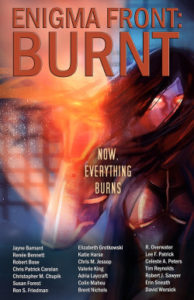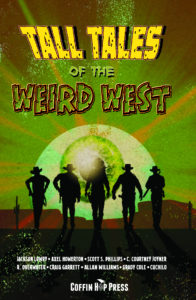An interview with Rick Overwater
 My guest today is Rick Overwater, longtime Calgary-based writer and musician and co-creator of the independent comic Futility.
My guest today is Rick Overwater, longtime Calgary-based writer and musician and co-creator of the independent comic Futility.
Tell us about the latest story in the Burnt anthology
In my mind, it’s a Weird West story, but I’m lousy at identifying genres. I’m told it’s more alternate-history sci-fi or sci-fi fantasy. Like all stories in Burnt, it involves burning or fire of some sort. In this case, mysterious orbs fall from the sky over the Alaskan forest, triggering forest fires wherever they land. Two late-19th-century men ride through the ashes, collecting the shiny globes. One man is on a quest for redemption, the other seeks fame and fortune. Neither understand what awaits them, or how their choices may hasten their own doom.
What inspired it?
Inspiration is a strange thing for me. Sometimes, I’ll learn of a real-life event and think of ways to manipulate it and add to it to create fiction. More likely, I’ll be standing in the aisle at the grocery store or driving down the highway and an idea will just pop into my head. This was the latter. The picture of a sallow-faced man coughing up blood and a cowboy with bad teeth riding through a field of black ash just came out of nowhere. Once I have something like that, if I keep rolling it around in my head, other ideas, some I may have already conceived of, will “stick to it” until there’s enough for a story.
Tell us about your story in Tall Tales of the Weird West
It’s probably the darkest story I’ve yet to write. I had the idea of pitting a loathsome man, but a respected public figure, against a gentle, intelligent man who unfortunately has a psychological condition that makes him desperately homicidal if he has to be in a room with more than two other people. Like a lot of my stories, it’s set in the late 19 century, of a weird-western bent. Things don’t go well for most of the characters.
How long have you been writing?
 Depends how you look at it. I began writing poetry and making comics as a tween. I started working as a journalist and copywriter in the early 90s, so I’ve been a (cough) “professional” writer for about 16 years now, give or take.
Depends how you look at it. I began writing poetry and making comics as a tween. I started working as a journalist and copywriter in the early 90s, so I’ve been a (cough) “professional” writer for about 16 years now, give or take.
What are your influences?
I struggle to discern between what I like and what actually impacts how I write. I love Hemingway and Raymond Chandler and all that manly-man stuff but, it’s hard to replicate in a way that’s appropriate for today’s world. I think the vibe from years of Robert A. Heinlein and Robert Silverberg permeates my science-fiction ideas. I waffle between wanting to replicate the dazzling word-work of Patrick deWitt and the antiseptic prose of writers like Daniel Silva. Being a fan of graphic novels, I find the the grand concepts of Alan Moore and Charles Burns set the bar fairly high, and I aspire to epics like that. Could I be any more vague?
Tell us about your work with comics
Writing a comic script is nowhere near as enjoyable as writing straight prose for me but I absolutely love seeing the pictures in my head turn into art on a page. It’s worth it. My long-time creative partner Cam Hayden and I have a love of low-brow, gross humour, the kind that seems idiotic on the surface but (hopefully in our case) has intelligent forethought rippling beneath the surface. We attempt to pull that off in Futility, a comic where a straight, male farmer from the 60s is lost in space and has to confront his preconceived biases at very turn. It’s a love letter to Weird Science, Heavy Metal, and Mad Magazine all rolled into one. So far it’s proven to be a bit “out there” for a lot of folks and exactly what a small, somewhat underserved niche is looking for and sales at conventions have been good. It’s the kind of stuff I myself buy, when I can find it.
I’ve had some interest in a short steampunk novel I finished last year but two different publishers have said it needs to be longer, so I’ve been chipping away at lengthening it. I’m rewriting a hard-boiled-detective-cyberpunk short story and awaiting feedback on a fantasy short I just finished—both of which I hope to submit to anthologies with December 2016 deadlines. I’m slowly thumb-nailing Futility #5 as well. So… perhaps the correct answer is a “a whole bunch of stuff, but completing very little.”
What do you do to promote yourself and your work?
Not enough! My day job is demanding, so not go insane I tend to focus my limited time on the creative stuff. I maintain a website, not as regularly as I should, use HootSuite to be active on Facebook and Twitter, and do what I can. I have a MailChimp mailing list for my comic, but don’t hit our readers that often. I have been amassing blog material, and will be trying to blog more regularly. When I have a novel to promote, I suspect I’ll summon the energy to step my game up.
Do you go to conferences and events?
Definitely. All writers should. I don’t go to too many, but I hit When Words Collide every year and at least two omic and entertainment expos. I interviewed Rhett Miller from the Old 97s once and he said the “people who make music their whole life are usually cursed to be unable to do anything else.” I feel that applies to writing as well, and I enjoy meeting my fellow accursed. I’d go to more of them, but I save some of my vacation time for family who are less inclined to want to spend entire weekends sitting in butt-numbing convention-room chairs.
Tell us about your work as a musician
It definitely shaped my writing for better and for worse. I went to college for journalism, before changing majors, so I could learn to write and be employable like my heroes at the time, Hemingway and Gregory Mcdonald. Then I got a guitar and ruined everything. The immediate gratification of just grabbing an instrument and having your ideas come out of it and, later, free beer and the attention of girls (something I was completely unaccustomed to) derailed my prose for 15 years. But I was taking some poetry classes at the time when I began playing and I liked story based songs so, through songwriting, I got pretty good at one-page plot outlines. Listen to “Boy Named Sue” or the “Wreck of the Edmund Fitzgerald”—perfect plot outlines. Poetry tells you to eschew rhymes though, and music is all about rhyming, albeit wordlessly. So I watch out for that, and I do get busted for accidentally rhyming in prose or using too much alliteration. These days, I’m focused more fiction and play less. I have several albums on Winnipeg’s Transistor 66 Records and I did get to see a lot of Canada—the parts of Canada that consist of concrete basement dives with barely functioning bathroom stalls.
You can learn more about Rick and his work at the following links.
Website: www.overwater.ca
Twitter: @rjoverwater
Blog: http://roverwater.tumblr.com
Facebook: https://www.facebook.com/rick.overwater




